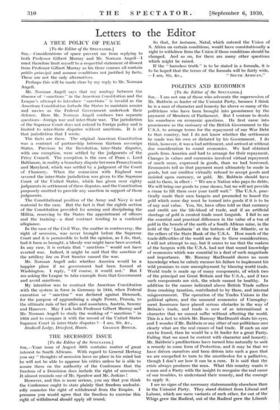Letters to the Editor
A TRUE POLICY OF PEACE
[To the Editor of the SPECTATOR.] Sin,—Considerations of space prevent me from replying to both Professor Gilbert Murray and Mr. Norman Angell—I must therefore limit myself to a respectful statement of dissent Irons Professor Gilbert Murray as his three courses all contain petiftia principii and assume conditions not justified by facts. These are not the only alternatives.
Perhaps this will be made clear by my reply to Mr. Norman Angell.
Mr. Norman Angell says that my analogy between the absence of "sanctions in the American Constitution and the League's attempt to introduce "sanctions' is invalid as the American Constitution forbade the States to maintain armies and navies as the Federal Government undertook their defence. Here Mr. Norman Angell confuses two separate questions—foreign war and inter-State war. The jurisdiction of the Supreme Court does not extend to foreign policy and is limited to inter-State disputes without sanctions. It is of that jurisdiction that I wrote.
The facts are these. The original American Constitution was a contract of partnership between thirteen sovereign States. Previous to the Revolution, inter-State disputes, with one exception, were settled by the judgments of the Privy Council. The exception is the case of Penn v. Lord Baltimore, in reality a boundary dispute between Pennsylvania and Maryland, which was settled by a judgment of the Court of Chancery. When the connexion with England was severed the inter-State jurisdiction was given to the Supreme Court of the United States, which has given over eighty judgments in settlement of these disputes, and the Constitution purposely omitted to provide any sanction in support of those judgments.
The Constitutional position of the Army and Navy is not material to the case. But the fact is that the eighth section of the Constitution provided for arming and disciplining the Militia, reserving to the States the appointment of officers and the training—a dual contract tending to a confused allegiance.
In the case of the Civil War, the matter in controversy, the right of secession, was never brought before the Supreme Court and it is permissible to hold the opinion, as I do, that, had it been so brought, a bloody war might have been averted. In any case, it is certain that " sanctions " would not have averted war. Indeed, it might be said that the sanction of the artillery fire on Fort Sumter caused the war.
Mr. Norman Angell asks whether America would be a happier place if no government had been formed at Washington. I reply, "Of course, it would not." But I am asking the League to take example from that Government and avoid sanctions.
My intention was to contrast the American Constitution with the system in force in Germany in 1844, when Federal execution or " sanction " was declared against Denmark, for the purpose of aggrandizing a single Power, Prussia, to the ultimate ruin of her allies and associates, Austria, Saxony and Hanover. May I ask both Professor Gilbert Murray and Mr. Norman Angell to study the working of " sanctions " in 1864 and to compare it with the record of the United States Supreme Court in inter-State disputes ?—I ant, Sir, atc., Studwell Lodge, Droxford, Hants. GRAHAM BOWER.






























 Previous page
Previous page